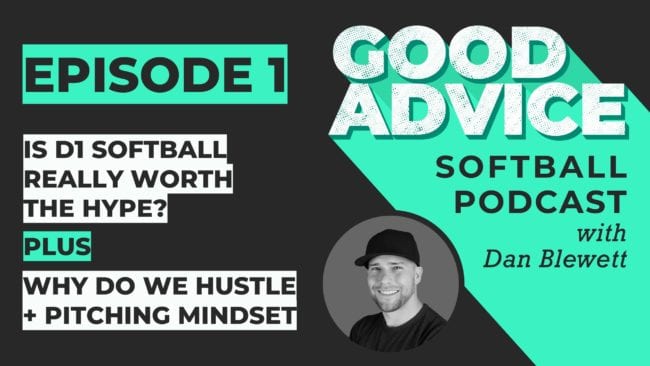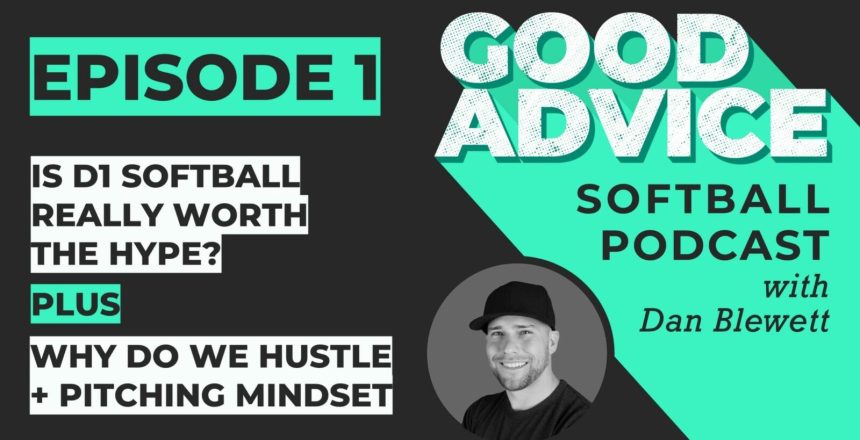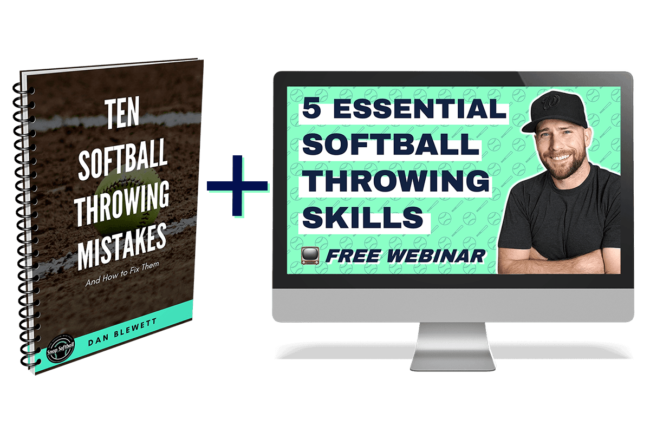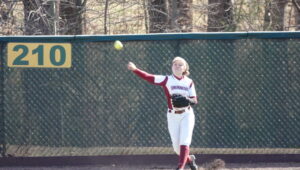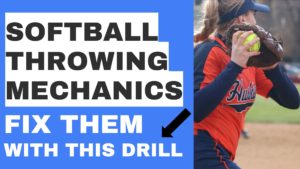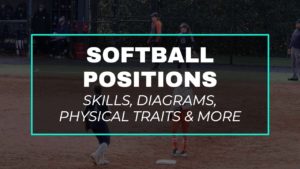*This article may contain product links which pay me a small commission if you make a purchase. Learn more.
D1 fastpitch softball is a dream for many softball families, but is it really all its cracked up to be? Is D1 softball this magical, big-time thing that families should pour thousands of dollars into? In episode one of the Good Advice Softball Podcast, Dan talks about what’s college softball is really like, how its different from lower levels of amateur fastpitch, and whether the juice is really worth the squeeze.
To submit a question for the Good Questions Q&A segment, make a voice recording and email it to Dan at hello@danblewett.com.
Want to support the show? Enroll in one of Coach Dan’s online throwing courses or his mental skills course. Use code GOODADVICE to save 20% on any course, just for being a listener.
Sign up for Dan’s Email list and get his free throwing eBook, and follow up with him on the interwebs: YouTube Channel | Twitter | Snapsoftball.com
Podcast: Play in new window | Download
Subscribe: Apple Podcasts | Spotify
Full Transcript: Good Advice Softball Podcast EP1
You’re listening to the good advice softball podcast. I’m Dan Blewett. And on this show, you’ll learn how to help the softball player in your life, sharpen her skills, improve her mindset, and find new confidence through softball ball. Welcome to good advice.
I’m Dan Blewett, and in today’s episode we’re going to talk about this huge prize that everyone’s chasing. And that is D1 softball, and maybe a little less specifically just college softball. So in all my years as a coach, and this is not exclusively softball, but equally baseball. It seems like players and parents put that label of collegiate athlete and also D1 athlete on this artificially high pedestal. And so I want to take today’s episode to kind of go over what it actually is that you’re chasing. Because I’ve been to a lot of D1 baseball games.
I was a D1 baseball player. I’ve been doing a number of D-1 softball games recently. And I think that a lot of times parents and players lose sight of what it actually is and they, they glorify it and they idolize it in a way that’s not really congruent with reality because we act like, do you want softball? Is this magical, this magical place worth.
Being crazy over, I mean the way some parents act at games, the way some parents and families shell out money as if there’s some greater good than really just playing more softball. So I want to start by comparing high school softball to Dijuan softball because I don’t think the differences are as great as you think so. First, let’s talk about the stadium experience.
So if you play high school softball, whether it’s, you know, fresh off junior varsity or high school, the field’s essentially going to be lined with parents and it’s going to be lined with other athletes who support the team. You know, your, your, your daughter’s boyfriend who plays, you know, he’s a cross country runner or a football player. He’s going to come out and watch, you know, the grandparents are to come out and watch. But in general, a high school softball field is lined with parents and a handful of other athletes to cheer on their friends. In D1, the vast majority of D1 softball fields, this is exactly the same.
Now they’re like the top 25 you know, some of the premium schools, the sec, the PAC 12 these really big schools, some of them can draw a pretty substantial, I mean amazing crowd, but that’s by far the exception and not the rule. So I think a lot of times we get, we get mixed up thinking that all college softball looks like the college world series, all college baseball looks like the college world series. And then it just doesn’t, the vast majority of division one programs. They get a hundred fans a game, they get 50 fans a game. A lot of times because parents aren’t even that close. I mean, more, more parents live geographically far away from their daughters in college than they do locally. You know, moms and dads and grandparents can come out and watch every game locally, you know, an amateur ball and in high school and junior varsity and junior high.
Whereas now she gets a scholarship, she goes and plays six hours away. You know, family can only come maybe a handful of weekends a year. And, obviously the, the United States is used that expands, can get really, really far away when now mom and dad can’t really come to the game. So now, you know, the television crews aren’t coming a lot of, athletic fields on especially bigger campuses and D1 schools are always bigger campuses. They, they’re not usually on the beaten path.
They’re not usually in the center of, of school where kids are gonna stop and watch a game. And. And that’s not really something that college students do. They don’t just really stop and say, Hey, I’m going to watch two hours of softball real quick just because of softball fields here in the middle of campus. I mean, the reality is that most of the student body will never go to a sporting event that’s not football or basketball. I mean, that’s just the reality. They’re not going to watch swimming or the track team, the baseball team, the softball team, those seem like pretty mainstream sports and they are.
But that’s not how college life works. I mean, one great example is a university of Maryland baseball. There. Their field is right by the football field. It’s smack in the middle of campus, and that baseball team still only gets 102 hundred fans a game at most. So, you know, we start to put this a D1 thing on a big pedestal. Whereas in reality, the fan experience, aside from playing on a much nicer field. It’s mostly the same.
You go play D-I baseball, D-I softball, and it says magical thing, but it’s really, it’s just an extension of travel. It’s just an extension of high school. It’s really the same just on a slightly nicer field or vastly nicer field depending on where you come from, but it’s not this, this beacon, this diamond, this magical thing that a lot of us think that it is. Obviously, if you go play for university of Oklahoma or UCLA or Florida state, that’s a little different. That can be a big time experience, but.
The vast majority of you listening to this, your daughters won’t be able to play there. They won’t be good enough. And that’s just unfortunately the reality that only 10% of all D one schools are in that top 25 there’s 300 D one schools. So we just need to be realistic about what we’re chasing and why and what it actually looks like. I mean, do you know what that goal looks like? That, and I know most of you are very reasonable in your expectations listening, but. A lot of families get really wrapped up in this prize that maybe isn’t as sparkly as we think. The other things, the, the peripheral stuff, the uniforms, the gear, those are things that obviously athletes love. Like everyone loves getting a cool new dry fit and a great hoodie and nice uniforms. But I’m here to tell you that, yeah, college swag can be really nice, but it’s not that much different than the swag that you pay for. I mean. Amateur teams are pretty well outfitted these days. You know, they have a couple uniforms, they have alternate jerseys. They have really nice hats, visors, great socks, great cleats, $400 bats. There’s not a lot of difference in a D-1 program, and we’re not even talking about and junior college programs yet who have.
A very similar experience, but does it like less lesser facilities, lesser uniforms? Really just the peripheral things, are different, but the experience is largely the same. You go play junior college, you’re still getting a very similar, fan experience to a D-I program. And so when we start, say, I, I’ve got to play D-1 softball, unless you’re playing in the top 25 one of those premium big name college world series sort of caliber schools, they all become quickly very, very similar. The next thing is classwork. Obviously you’re going to go to class, whether you’re a high school or a college athlete, you’re going to have to do that. You’re gonna have to put in the work.
There’s really no distinction there. You’re going to have more work in college, but your days are less structured. Kids are extremely busy in college and a lot of players drop out. And this is all sports when they get to college cause they realize, man, like it looks cool to be a regular student. Like they get to go party, they get to go to concerts, they get to go to spring break. They get to do a lot of stuff in the summer and the in the winter. Like they just get to have a much more diverse student experience. And being a, do you want an athlete is great. I mean, there’s perks. Don’t get me wrong. I loved being one of myself.
I don’t think many athletes that make it to the end. and graduate as a college athlete would ever give that experience back, but it’s, it’s a very constrained, prohibitive. So you’ve experienced, it’s very different. You’re up at 7:00 AM a lot of days cause you have to take earlier classes. You have to, you work out sometimes in the pool or in the weight room, whatever. Before classes, you gotta have your classes done by 1:00 PM. So you can be at your two to five workouts, your practices after, after, after, you know, in the late afternoon. And then after you get home, you gotta eat dinner and you do your schoolwork and prepare for the next day. So that’s not normal student life. And that’s why a lot of kids, they get to college and they make it one semester and then they’re done, and they chase this thing for so long, and I’ve trained a number of kids that did this in my academies one year, one semester, one year, whatever. They’re gone, they just don’t want to do it anymore.
They want to be a normal student, and that’s okay. Everyone’s end of the road comes at a different time, but it’s not necessarily. A better experience being a D one athlete, unless you really passionate about putting in the work for your sport. Because D-1 sports sports, to a lesser degree D three sports, there are a lot of work. And I only say that in that sense because D3 schedules, the less rigorous you’re gonna play less games, practices, or fewer in the fall, especially. it’s not to say that you’re any lesser of an athlete playing D-III cause you’re not. It’s just like it’s, it’s a less rigorous schedule than and that’s just unfortunately a fact. So that’s just sort of what you’re signing up for.
If you want to have a little less constrained schedule, then dethrone is a better fit for you because you will have more time in the fall, you will have less practices, you will have a less rigorous schedule if you’re a D1 athlete. And there’s exceptions to that for sure. But that’s on the whole more of the experience. And lastly, travel kids travel so much these days on these high level teams. It’s not vastly different than the college schedule. Obviously you’re playing, you know, 60 games in the spring, and you’re going to be on a bus. You’re going to be away for the weekends. And again, this is where the, the student athlete experience changes a lot, but it’s not that different than, than a summer of, of really busy of tournament softball. You know, you’re going to be gone for the weekends there too, just the same. Right. And, and so players are used to that.
So when you really break it down like this. There’s not that many differences except for the nicer field, the nicer facilities, you’re away from home, but all the peripheral things, the spectators in the stands, you know, the, the overall experience, the nice uniforms, the classroom work, the travel, all that’s very similar. It’s eerie, eerily similar where we put on this big pedestal and it really, for the vast majority of college, college programs. It doesn’t, it really just doesn’t belong on that pedestal.
And it’s not to say that it’s anything less valuable or a change worth chasing. I just think it’s worth understanding what you are chasing. Because for a lot of us, again, we think of D one softball as this big, shiny college world series caliber experience, and it’s not. It’s, it’s two teams of really athletic players playing in front of 50 parents and a couple of boyfriends and girlfriends and a couple of grandparents and a couple of administrators and supportive teachers. And a couple of, you know, regular narcs from the student body. And that’s just a derogatory term that athletes use as, to their regular student brethren. It’s called a non-athletic regular people. So just a little. A little, little non-athlete slang, but that’s what the experience is.
So if you go to a D1 softball game, that’s what you’re going to see. And I think sometimes players and families lose their way chasing this thing. It’s not as glamorous as it could be. So why do we chase it then number one, you know, obviously you want a great degree, and this is where it also comes down to. Don’t go to a D one school that doesn’t fit you as well academically as a D2 or D3 or maybe even a junior college where you can save a lot of money, and still academically get what you want or more.
It doesn’t make sense when almost no college softball players turn pro to go get a lesser degree at a big, big time school versus a more powerful degree or turned down in scholarship money. From a school that doesn’t have the prestige maybe as D-2 or D-3 or junior college, but is going to give you a better academic track, save you a lot of money, and college degrees are worth less than they’ve ever been worth.
And the financial risk and reward is way out of whack, and that’s hopefully going to change soon. But what you get for your $120,000. Is less than ever. And that debt can haunt a lot of people for a long time. So the degree needs to still be number one. And again, sometimes you might have a low D one offer and then some great D three offers that make more sense academically and longterm.
And that’s a very. Reasonable choice to make the choose the lesser college softball program and go on the better longterm academic track. Because again, if you talk about a low to mid tier D-1 you’re still getting 50 fans in the stands and a nice ballpark to play at. But beyond those things, it’s very, very similar to You’re going to get 50 50 fans in the stands and still a pretty nice ballpark. And you’re gonna have a lot of kids that still care a lot about the game and compete and work really hard, and you’ll still get all the comradery and all that stuff that you really end up cherishing when you leave. So the other two main things are living where you want to live. And this is another reason not to choose a bigger program, just because it’s don’t go to some small town that you don’t see yourself in. You know, if you want to be. You know, we’re working, you know, high level orthopedics, or you want to be in, in a, in a tech field, in the future, go where there’s really good tech jobs, you know, go where there’s really good, you know, medical schools in the area.
Don’t go to some small town that has a, a D one program. Just because it’s and this is a conversation I had with all sorts of athletes. They should go where there’s opportunity after college, not just my opportunity was to play here because that ends up being a dead end. It’s, I don’t want to live in this town. I would never live in this town outside of playing my sport here. That’s not a good longterm choice. But the really big thing that the biggest reason that playing at the highest level is a good choice is for competing. You want to compete. That’s the reason that we play our sport and for the comradery and all the life lessons. But. There’s a lot of athletes that just want to compete at the highest level they can to see what they’re made of.
And I applaud that. I applaud that mindset. That’s how I was. That’s how lots of athletes were. And so if you feel like I want to compete against the best possible athletes, I want to play D one because I can, and I want to pull myself up to that level and I want to just see what I’m made of and how good I can be against other players who are extremely good. The best, the best caliber that I can find. Then do it, then by all means go do it. But if you don’t feel that deep in your spirit, your soul, whatever you want to call it, then it’s probably not the right choice to turn down other opportunities academically or geographically or whatever. But if you really just want to grind it out and compete your face off because that’s the kind of athlete you are. And again, that’s awesome. And that’s really the number one reason to go as high as you possibly can is to compete.
And if that’s who you are, go do it. But if that’s not the number one thing, the absolute number one thing that gets you out of bed as an athlete, then you need to take a long look at the other options and why you’re doing what you’re doing and where you’re potentially going. And parents. If it’s not for them all about as not for your daughter, all about competing, then. This is should be a big family conversation about what is really at the end of the day. Right for you. Alright, so let’s do the 92nd mindset. So today, players, this is for you. And on each one of these, I’m going to do one time, there’ll be players and all the time it’d be coaches and all the time it’ll be parents. This isn’t just mental training for softball. This is.
A mindset change and something to contemplate. So today, players, why do you hustle? And this is one of those, it seems like one of those sappy, stupid, boring topics. But really hustling is one of those things. And obviously in baseball there’s the baseball gods. This is why I named my book to your baseball gods. It’s the same. There’s the softball gods and they’re not really these entities, but what they are is good and bad luck. And they’re the humble, the humbling that you get when you think you’re better than you are, or that the highs will not come down. And softball because of the vast amount of good and bad luck, the vast amount of bloopers that fall in of borderline strikes that either go your way or go against you, the bad hops, you know, the tough routes to ball that a player takes, that ends up changing a game. All those things, those are the reason that you hustle. The, as soon as you leave, you let your guard down, whether it’s in softball or it’s in life, whatever it is.
As soon as you let your guard down and say, I can walk here, I can let off the gas here. That’s when someone else who’s not letting off the gap catches up and you never catch up again after that. And the other thing is laziness is contagious. So some of the best teams I’ve ever coached against or played against their teams where they hustle and the hustle is clearly. Just viral. It’s contagious. And everyone on that team strides for every next base. They grind the game out, they refuse to bow down, they take every bat like it’s their last, they, they grit and they grit and they grit. And that is a contagious attitude. So as soon as one player on your team stops hustling and everyone else enables it, and they say, Oh, that’s okay. She’s tired. It’s been a long day. Nah, when you compete, you compete with yourself. And when you’re tired, everyone else is tired too, especially if you’re a hard worker and you’re in great shape. If you’re a hard worker and you’re in great shape and you’re tired, everyone’s more tired than you. That’s when you really have to dig deep. That’s when the hustle matters most, and that’s when you really separate yourself from everyone else on the field and your team from the lesser teams.
Cause if you’re tired, you can still muster the energy to hustle. And if you’re tired, then everyone else is more tired than you. So it’s not one of those overrated things. Coaches will complain to players about hustling over and over until you know the last game is played. But hustle is one of the most underrated, easy, completely within your power, things to control. And the longer you play, the less. Overrated. You will realize that it is. Hustle is extremely important and it will always come back in your favor and the softball gods will reward you. Alright, it’s time for good questions. Our listener Q and a segment.
Remember, if you have a question you’d like answered on the show, please email a voice recording to hello@danblewett.com. This is easy to do on your phone through the voice memos app on iPhones or any voice recorder app on Android. Links to email me are in the show notes. All right, so let’s do our Q and a segment here. good questions. So our first good question here is from Crimson. Hi, coach Dan. This is Crimson rice from Spokane, Washington. I have a question with regards to pitching during a game, sometimes I find myself overthinking pitching mechanics, which many times does not lead to the best outcome. What suggestions do you have to help pitchers overcome these tendencies?
Alright. Crimson. Great question. And as a former pitcher myself, I think everyone’s been down this road and it’s not limited to just pictures. It’s also hitters as well. So overthinking causes our action as athletes to become less fluid. We can’t possibly control ourselves through a game. So essentially there’s two parts to the athlete’s life. There’s practice and there’s games. So when you’re in practice, this is where you have a little more conscious control. Where you allow yourself to feel through your mechanics to try to make changes, to think a little bit more, and put your mind in your muscles to try to make, again, those mechanical adjustments to your swing, to your, your pitching mechanics, whatever it is.
When you get out on the mound, and this is easier said than done, or when you get in the box, you just have to be, and this is where it comes down to having a tunnel focus and some sort of focal point where you can sort of bring yourself back to be present. So one of the big mental skills is being present and present means I’m right here. I’m not thinking about the future, I’m not thinking about the past. And when we’re thinking about our Mike.
And when we’re thinking about our mechanics, we’re not in the present moment. We’re thinking in the past or we’re thinking in the future, we’re thinking about what I need to control to hit the ball. Well, what I need to control to make the pitch that I want to make. And so the biggest thing that athletes need to learn to master, and it comes back to this same thing, is that when I’m in the game, I’m no longer practicing. I’m in a game. My only job. Is to go through my mental checklist before a pitch. That means where my backing up, what’s the situation? How many outs, where the runners, what are my duties if I get a comeback or a bond to the left or the right, whatever it is, who’s on deck, who’s in the hole, who’s, you know, coming up next ending, whatever it is.
All those tasks have to be checked off your mental checklist. So you know, you don’t have to think about them in the future. You don’t have to worry about what you’re going to do. When the ball’s hit there or here where you’re going to go, et cetera. All the stuff in the future is covered and then your job is to choose your pitch and then everything else is done. So you know why you’re throwing it, you know what you’re doing. And now I’ve chosen, I’m going, you know, arise ball up middle here, and my only job now is actually that pitch. I visualize that pitch leaving my hand. I visualize the streamer of the way it streaks through the air and the neon path that it leaves behind me. And then I do it. I go do it. I don’t think, I just visualize.
I locked my eyes on the mic and I go. And so that’s easier said than done too. And so really the way to get yourself back to being present is by having some sort of action, some sort of reset action, whether it’s a deep breath, whether it’s a belly breath, where you push your stuff, your belly out and in, and you take your breath of that way. Which is some say as like a more calming sort of breath, whether it’s a slap on the thigh on the butt, or maybe you just like pinch yourself through your uniform pants.
Maybe you have like a little coin in your back pocket that you, you clenching your fist when you’re feeling stressed and you hold that in your hand at night on the couch when you’re relaxed. And so whenever you’re holding that coin in your hand. It puts you back in that relaxed place. All those are just a little methods where you can say, okay, when I’m stressed, I’m going to give myself a quick little slap on the thigh. I’m going to take a deep breath. I’m going to grab this little coin and hold it and remind myself that I’m not stressed. I just need to be here taking a deep breath and ready to execute my next pitch.
So all athletes have their own version of the reset, and it can take a lot of time to figure out what that looks like for you and how you can bring yourself back. But having some conscious awareness of that, this is the thing that you need to practice is crucial. So figure out what works for you, how you can try to snap yourself back into being present so you’re not worried about the future.
You’re not worried about the past. You’re not thinking through your mechanics and trying to control yourself like a robot. You can just relax, visualize yourself making the pitch, and then execute well. That’s all the good advice I’ve got for today. If you enjoy the show and would like to support me while also helping yourself enroll today and one of my online softball courses, my, she’s got a cannon throwing courses, come with pricing plans for any budget and my resolute athlete mental skills course will help your daughter or team build the mindset of a champion.

